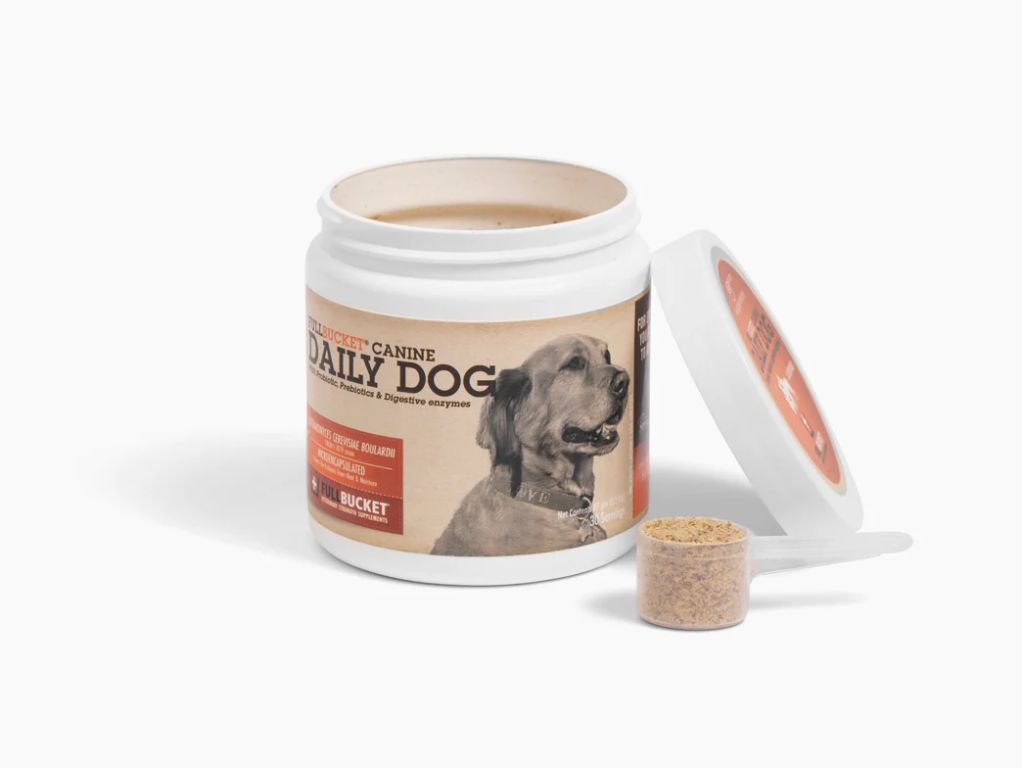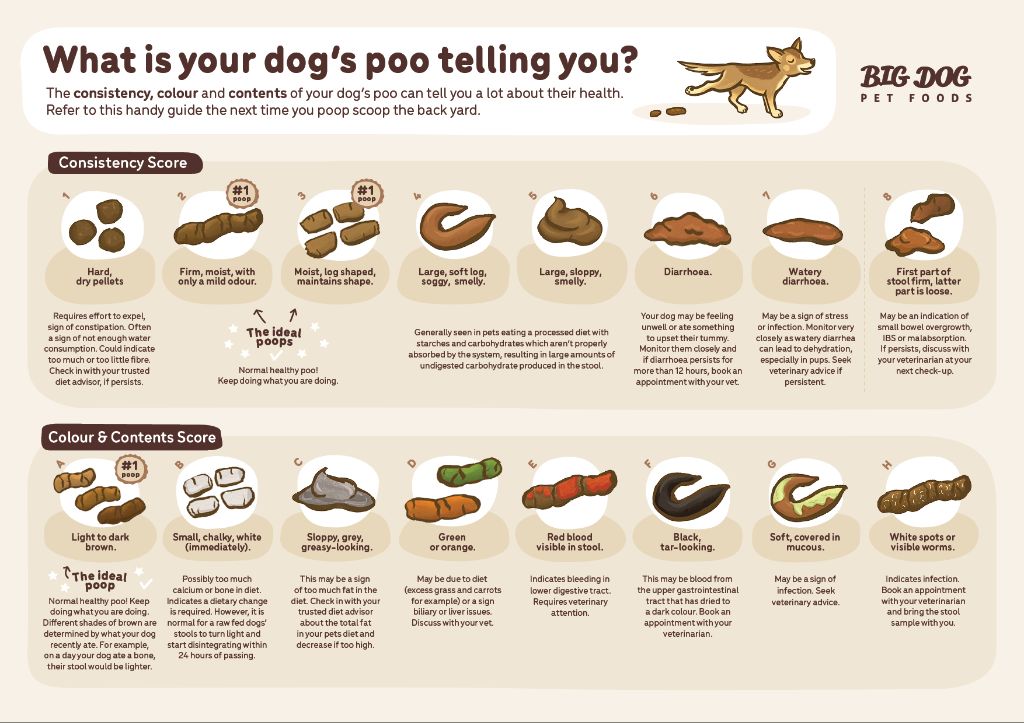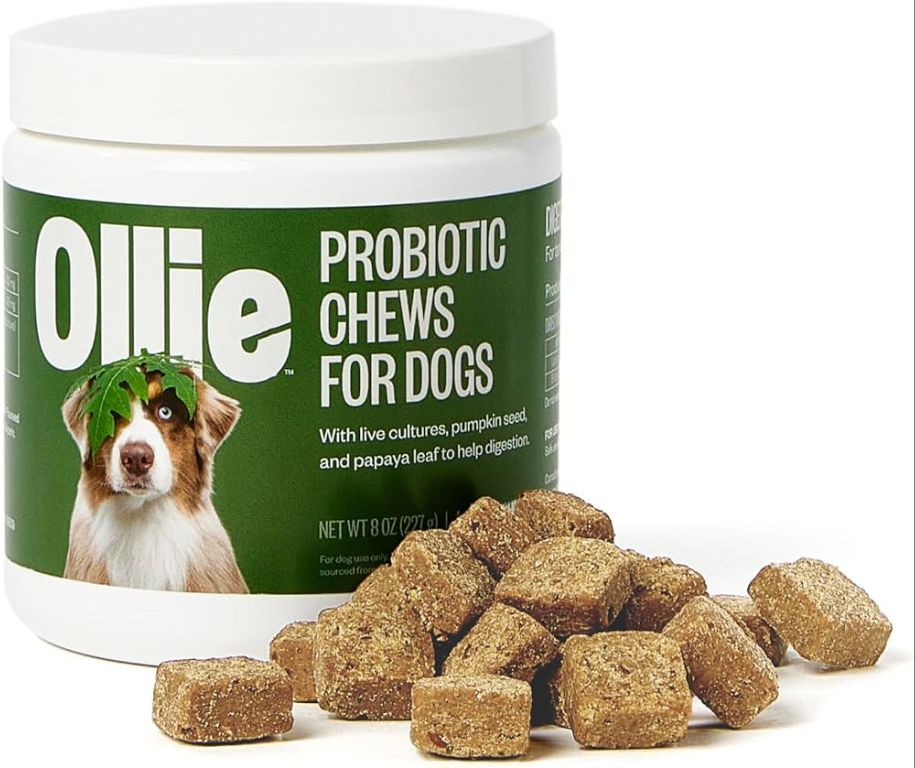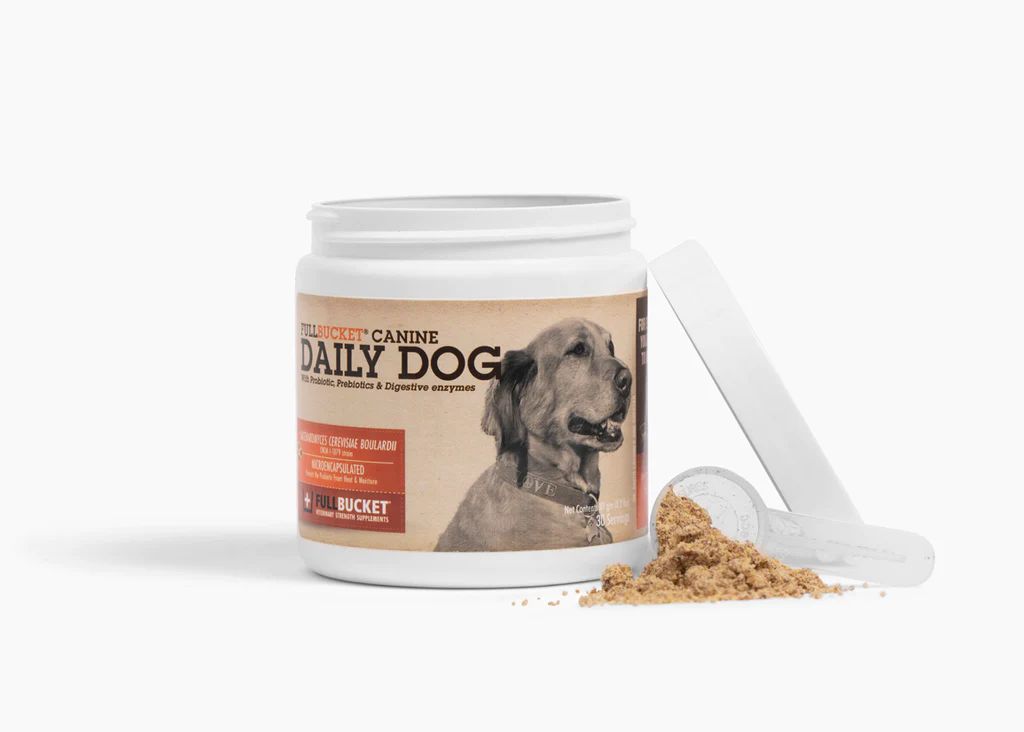Introduction
Dog owners have become increasingly interested in probiotics and their health benefits for pets. With so many products on the market, dog owners wondering if probiotics can help improve their dog’s digestive health and specifically firm up loose stools. This is an especially common question among owners of puppies or senior dogs who are prone to softer stool.
Understanding the science behind probiotics, their effects on digestion, and how to properly choose and administer them, can help dog owners make informed decisions about using probiotics. This guide covers the key aspects of probiotics for dogs – what they are, how they work, their impact on stool consistency, when veterinary advice is needed, and tips for choosing an effective dog probiotic supplement.
What Are Probiotics?
Probiotics are live microorganisms that are intended to have health benefits when consumed or applied to the body [1]. They can be bacteria or yeasts that help populate our gut with beneficial microbes. The most common probiotic strains are from groups known as Lactobacillus and Bifidobacterium. Probiotics are found in certain foods like yogurt, kefir, sauerkraut, and kimchi, as well as in dietary supplements.
When ingested, probiotics take up residence in our intestines and influence our gut microbiome. They help crowd out harmful microbes, break down food, regulate gut movement, and bolster gut barrier defenses. Probiotics may also support our immune function and produce vitamins for us. Overall, probiotics aim to restore balance to the complex microbial ecosystems inside our bodies.
Probiotics for Dogs
Probiotics are live, beneficial bacteria that can provide a range of health benefits for dogs when administered correctly. The main role of probiotics is to help maintain the natural balance of good and bad bacteria in a dog’s digestive system (source).

Some of the key benefits of probiotics for dogs include:
- Aiding digestion and nutrient absorption
- Supporting immune system function
- Helping reduce gas and occasional diarrhea
- Promoting a healthy intestinal lining
- Keeping yeast and pathogenic bacteria under control
Probiotics contain strains of live bacteria that normally occur in a dog’s intestines, such as Lactobacillus and Bifidobacterium. When introduced in sufficient amounts, these beneficial bacteria can thrive and balance out unhealthy bacteria. This helps support overall digestive health and immunity (source).
Some veterinarians may recommend probiotics to help regulate digestion and firm up stools if a dog has chronic soft stools or diarrhea. Probiotics can also be given preventatively during events that disrupt the microbiome, like antibiotic use or dietary changes.
Do Probiotics Firm Up Dog Poop?
Yes, probiotics can help firm up loose, watery stools in dogs. Probiotics contain live beneficial bacteria that help regulate and improve digestion. When dogs have an imbalance of good vs. bad bacteria in their gut, it can lead to diarrhea or loose stools. The beneficial bacteria in probiotics crowd out harmful bacteria and help normalize the microbial balance in the digestive tract (Source).

Specifically, probiotics boost populations of beneficial bacteria like Lactobacillus and Bifidobacteria. These good bacteria help break down and absorb nutrients from food. A healthy balance of gut flora allows for proper digestion and absorption of nutrients, resulting in normal, well-formed stools. Probiotics also help reduce inflammation in the gut caused by harmful bacteria (Source).
Additionally, some probiotics produce short-chain fatty acids that regulate gastrointestinal motility. This improves intestinal contractions to move food through at a normal rate. Proper motility and absorption of nutrients with probiotics leads to ideal poop consistency in dogs.
Other Factors That Affect Poop Consistency
A dog’s poop consistency can be affected by several factors besides probiotics. Some of the main elements that impact stool firmness include:
Diet
The type of food a dog eats plays a big role in poop consistency. Kibble, wet food, raw food, and table scraps can all affect stool firmness in different ways. High-fat diets or too many treats may lead to looser stools. Insufficient fiber can also cause softer poop. Switching foods or gradually transitioning to a new diet is recommended to avoid GI upset.
Hydration
Dehydration can lead to constipation and overly hard stool in dogs. Making sure your dog has access to fresh, clean water at all times is important. Increased physical activity or hot weather may increase your dog’s need for more water.
Exercise
Lack of exercise can contribute to constipation in dogs. Regular daily walks, play time, or other physical activity helps encourage healthy bowel movements. Puppies and high-energy dogs especially need plenty of exercise for good GI function.
Health Conditions
Certain illnesses may cause abnormal stool consistency in dogs. Parasites, infections, inflammatory bowel disease, cancer and other conditions can lead to diarrhea or constipation. Veterinary care is recommended if stool irregularities persist along with other symptoms.
When to Seek Veterinary Care
If your dog has mild diarrhea that lasts less than 24 hours, you can try treating it at home with a bland diet and increased water intake. However, there are some signs of more serious gastrointestinal issues that require prompt veterinary attention:
Diarrhea lasting more than 2 days (Cornell University College of Veterinary Medicine). Prolonged diarrhea can lead to dehydration, electrolyte imbalances, and other problems.
Diarrhea that appears bloody or black (Veterinary Emergency Group). This indicates bleeding in the GI tract and requires emergency care.
Repeated vomiting along with diarrhea. Vomiting and diarrhea together can cause rapid dehydration (Leo’s Pet Care).
Signs of abdominal pain like whining or arched back.
Diarrhea in puppies under 12 weeks old as they are prone to dehydration.
An inability to keep down any fluids.
Lethargy, weakness, or loss of appetite.
Diarrhea after recent diet change, boarding stay, surgery, or antibiotic use.
If your dog shows any of these signs along with diarrhea, call your vet right away or go to an emergency animal hospital.
Choosing a Probiotic
When choosing a probiotic supplement for your dog, it’s important to select a high-quality product. Here are some tips for selecting an effective probiotic:

Look for specific strains – The specific strains of bacteria are more important than the amount of bacteria. High-quality probiotics will list the exact strains on the label such as Lactobacillus acidophilus, Bifidobacterium lactis, etc.
Avoid “proprietary blends” – Probiotics that only list a “proprietary blend” don’t tell you the specific strains or amounts, making it impossible to know if it’s effective.
Choose viable organisms – Make sure the product contains live cultures and high colony forming units (CFUs). Look for at least 10-20 billion CFUs and strains that can survive stomach acid.
Check the expiration date – Probiotic supplements can lose potency over time. Don’t purchase or use products that are close to expiring.
Look for proper storage – Probiotics need refrigeration to maintain the live cultures. Purchase refrigerated supplements or products with special coated capsules.
Consult your vet – Always talk to your vet before giving any supplements to your dog. Your vet can recommend the best probiotic strains and CFU counts for your dog’s needs.
Administering Probiotics to Dogs
When giving your dog probiotics, it’s important to follow the proper dosage recommendations. Probiotics will come with dosage instructions based on your dog’s weight. Make sure to follow these carefully, as too much can cause side effects like diarrhea. The dosage may need to be adjusted based on your dog’s health needs.
In terms of timing, it’s best to give probiotics with food, as this helps deliver the live cultures to the intestines. If giving a supplement, you can mix the powder into your dog’s regular kibble. For chews or tablets, give them alongside mealtime. Space out probiotic supplements evenly throughout the day. Giving smaller doses 2-3 times daily helps maintain levels of beneficial bacteria.

If your dog is prone to an upset stomach, start with a low dosage and work up gradually. Introducing billions of new microorganisms at once can cause diarrhea. It may take 2-4 weeks to see benefits from probiotics as the gut microbiome is rebalanced. Be patient and consistent with administration.
Probiotics can be given for both short-term issues like diarrhea and long-term gut health. They are safe for daily use, though a veterinarian should advise on your dog’s needs. Overall, follow label instructions and consult your vet on the right probiotic regimen for your pup.
Other Uses of Probiotics
Beyond digestive health, probiotics can provide other benefits for dogs as well. Some key uses include:
Skin Health: Probiotics may help reduce skin inflammation, irritation, and allergies in dogs. Certain strains are thought to inhibit the growth of bacteria that can contribute to skin issues. Probiotics may also help restore balance to the skin microbiome.
Dental Health: Some probiotic strains can reduce plaque buildup and the amount of harmful bacteria in a dog’s mouth. This may help improve bad breath and dental health. Probiotics may also reduce gum inflammation.
Immune Health: By supporting intestinal and microbiome balance, probiotics can help strengthen a dog’s natural defenses. Some strains may help stimulate immune cells and antibody production. This can enhance resistance to viruses, infections, and allergies.
So while regulating digestion and poop consistency is a major use for probiotics in dogs, they offer benefits for skin, dental, and immune health as well. Consult your veterinarian on the best probiotic options to meet your dog’s specific needs.
Conclusion
In summary, while probiotics may help firm up a dog’s stool in some cases, they do not directly affect stool consistency. Probiotics support digestive health by maintaining a balance of good bacteria in the gut. This can strengthen the immune system, aid digestion, and crowd out harmful bacteria. But other factors like diet, underlying conditions, medications, stress, and environment play a bigger role in poop firmness.
The main takeaways are:
- Probiotics benefit canine digestive health but do not directly firm up poop.
- Diet, hydration, exercise, underlying illness, and other factors primarily determine stool consistency.
- Soft or loose stools in dogs warrant an exam by a veterinarian to check for underlying issues.
- Probiotics are considered safe nutritional supplements but consult a vet before giving them.
- Look for dog-specific probiotic strains when choosing a supplement.
While probiotics may offer general digestive support, they should not replace diagnosis and treatment of medical conditions causing loose stools in dogs. Monitoring your dog’s poop consistency and seeking veterinary advice for significant changes is important for their health.
